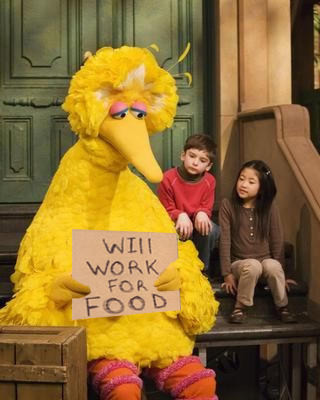Presidential Debate 2012: Romney Thrusts Big Bird Into The Spotlight, Sparks Twitter Controversy
Why was @FiredBigBird fired from Twitter?

Most anyone who watched the first 2012 presidential debate between incumbent Barack Obama and his Republican challenger Mitt Romney on Wednesday night would likely agree that it was a bit of a snooze: None of the promised “zingers” materialized, and the leader of the free world looked as though he would rather be taking a nap (or cuddling up to his wife Michelle in celebration of their 20th wedding anniversary) than sparring with his challenger. The topic of the first of three presidential debates was domestic issues, and much of the 90-minute discussion focused on critical but rather dry economic data and policy details.
It’s no surprise, then, that audiences latched on to the errant pop culture reference made early in the debate, when Romney – directly addressing debate moderator and veteran PBS anchor Jim Lehrer -- reiterated an earlier promise to pull funding for the public television network, which has broadcast the children’s variety show “Sesame Street” since 1970.
“I’m sorry, Jim. I’m going to stop the subsidy to PBS,” Romney said. “I’m going to stop other things. I like PBS. I love Big Bird. I actually like you too. But I’m not going to -- I’m not going to keep on spending money on things to borrow money from China to pay for.”
Romney’s patronizing statement quickly became a talking point on social media, and the beloved “Sesame Street” character has enjoyed extra attention and an outpouring support from thousands who want to spare the supersized yellow bird from Romney’s ax. The phrase “Big Bird” reached 17,000 tweets per minute on Wednesday night, and inspired numerous Big Bird-related Twitter accounts and parodies.
Wednesday’s debate was not the first time Romney has proudly spoken of his intent to snatch away support from PBS. In May, he told Time magazine’s Mark Halperin that he intended to cut funding to PBS despite his stated wish that his grandchildren might have the opportunity to watch it. “I think there will be things that we think are nice programs,” he told Halperin, “and we’ll say to ourselves, is this program so critical it’s worth borrowing money from China to pay for it?"
While there is, technically speaking, an indirect link between government subsidies for public programs and the United States’ foreign debt, Romney’s repeated invocation of the China-PBS relationship amounts to little more than shallow rhetoric.
According to a Sept. 4 Fox News report, China holds less than 8 percent of the $16 trillion national debt: While that figure itself is certainly nothing to sneeze at, cutting funding to PBS would barely represent a drop in the deficit bucket. According to the same Fox News article, two-thirds of the national debt is in fact domestic.
And as a Thursday Forbes report pointed out, the subsidy in question does not go directly to PBS, but the Corporation for Public Broadcasting, a bipartisan board that also supports NPR. The portion of the federal budget allocated to CPB represents a tiny fraction of 1 percent; according to Forbes, about 1/100 of a percent. And only a fraction of that fraction of a percentage goes to PBS. The funding is nonetheless significant to the network – representing about 12 percent of PBS’s revenue, an amount that is essential to its survival.
A 2011 bipartisan survey cited in the Washington Post found that 69 percent of American voters oppose the elimination of federal funding to PBS and other public broadcasting outfits – a figure that far exceeds the 47 percent of voters that Romney famously dismissed at a private fundraiser in Florida in May.
The reaction to Romney’s Big Bird threat indicates the needle has not moved: “Big Bird” has been a trending Twitter search term since Wednesday night, and countless Big Bird memes have been created in response to Romney’s comments. One doctored image shows Big Bird waiting in a Depression bread line, and another finds a forlorn-looking Big Bird holding a sign reading “Will Work for Food.”
One parody account, @FiredBigBird, generated more than 2,700 followers in a matter of minutes, according to a tweet from ABC's "Good Morning America." But the account – which has well over 20,000 followers -- was suspended late Thursday morning ET, prompting temporary Twitter outrage and accusations that camp Romney was somehow behind the meta-firing. By late afternoon ET, the account was restored with assurances the blackout was the result of a Twitter algorithm that triggered an auto-suspension. “Nothing nefarious or anything of the such,” tweeted @FiredBigBird. But by 3 p.m., the account appeared to have been suspended once again.
While the Big Bird of Twitter appears to be an endangered species, an ABC News report on Thursday contextualized the perceived threat to Big Bird and his fellow “Sesame Street” characters, claiming that “Sesame Street” has some immunity to any potentially devastating PBS cuts. “Sesame Street” executive vice president Sherrie Westin had told CNN a week ago that the show is primarily financed by donations, corporate sponsorships, and merchandising; and that it receives “very, very little funding” from PBS.
But such a disclaimer will likely do little to curb the Twitter frenzy – this bird has flown, and people appear to be having way too much fun to come back down to earth anytime soon. The official “Sesame Street” Twitter jumped in with a message attributed to Big Bird on Thursday morning: “My bed time is usually 7:45, but I was really tired yesterday and fell asleep at 7! Did I miss anything last night?”
Perhaps the tweet that sums up the public sentiment to Romney’s comments came from one @EdReform: “Yo, Mitt Romney, Sesame Street is brought to you today by the letters F & U!"
© Copyright IBTimes 2024. All rights reserved.






















